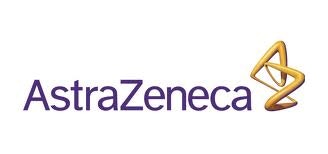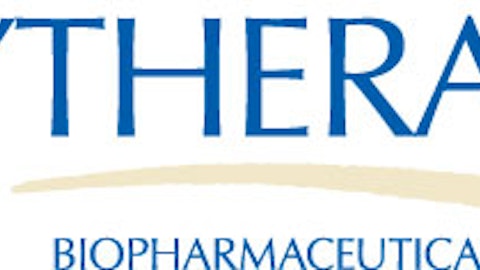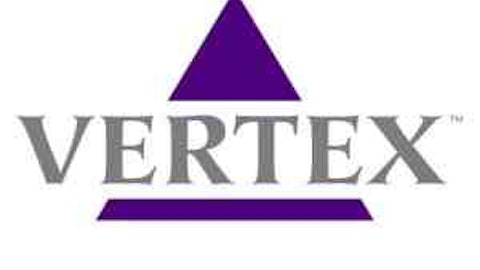Two big pharmaceutical players on opposite sides of the Atlantic have forged yet another bond.
Through the years, London-based drugmaker AstraZeneca plc (ADR) (NYSE:AZN) and U.S. pharmaceutical firm Merck & Co., Inc. (NYSE:MRK) have partnered on several occasions to develop drugs together. Last week, the two companies added another deal to the list with an agreement for AstraZeneca plc (ADR) (NYSE:AZN) to license Merck & Co., Inc. (NYSE:MRK)’s experimental cancer drug MK-1775. Here are the three most important things you need to know from this recent agreement.
1. Money for Merck & Co., Inc. (NYSE:MRK)
Granted, with $16 billion or so socked away in liquid assets, Merck & Co., Inc. (NYSE:MRK) isn’t in desperate need of cash. Every little bit helps, though. And, with the MK-1775 deal, this latest little bit totals $50 million upfront with the prospects of more down the road from milestone payments and royalties.
MK-1775 is an oral small molecule inhibitor of WEE1 kinase in phase 2a trials targeting treatment for certain types of ovarian cancer. Why would Merck & Co., Inc. (NYSE:MRK) want to license the drug rather than develop it on its own? It’s not really for the money.
Merck & Co., Inc. (NYSE:MRK) wants to be able to focus more attention on its other cancer drugs. Foremost among these is vintafolide, which the company licensed from Endocyte, Inc. (NASDAQ:ECYT) in April 2012. Vintafolide is currently under review in the European Union for treating platinum-resistant ovarian cancer and is in phase 3 studies for the same indication in the United States.
The other primary cancer drug that Merck wants to further along is MK-3475. This experimental drug is currently in a phase 2 study for treating metastatic melanoma. MK-3475 targets the Programed Cell Death-1, or PD-1, protein, and by doing so, boost the body’s immune system to fight against cancerous cells. Merck trails behind Bristol-Myers Squibb Co (NYSE:BMY), whose anti-PD-1 drug nivolumab is already in late-stage testing.
2. Alternatives for AstraZeneca plc (ADR) (NYSE:AZN)
While Merck gets some money and the opportunity to focus on other solid opportunities, the MK-1775 licensing arrangement gives AstraZeneca plc (ADR) (NYSE:AZN) another drug to bolster its oncology pipeline. The British drugmaker counts one cancer drug in phase 3 right now, with six other drugs in phase 2 studies. Three of these current cancer candidates are small molecule drugs like MK-1775.
AstraZeneca plc (ADR) (NYSE:AZN) picked up rights to selumetinib from Array BioPharma back in 2003.
The drug is advancing to separate phase 3 trials this year in treating melanoma and non-small cell lung cancer.The company also has gastric and breast cancer drug AZD4547 in phase 2 testing.
Olaparib targets BRCA-mutated ovarian cancer. AstraZeneca plc (ADR) (NYSE:AZN) enrolled its first patient in a phase 3 study of olaparib earlier this month. If all goes well in testing for both olaparib and MK-1775, the combination of the two drugs would give the company a strong ovarian cancer product portfolio.
3. Lag for legalities
All of the talk about licensing MK-1775 isn’t done yet. The deal is contingent upon getting past the waiting period enforced by the Hart Scott-Rodino Antitrust Improvement Act. This law requires that the parties wait for the federal government to work through any antitrust concerns.
In this case, there really shouldn’t be any significant hurdles. Licensing of one drug isn’t a major issue for the Federal Trade Commission when there are several companies competing in the cancer drug market. There will be a little big of a lag for the legalities to be reviewed, but this deal seems likely to sail through with flying colors.
Winners all around
This appears to be a win-win scenario. Merck wins by benefiting financially from MK-1775 while getting to focus more on its later-stage drugs. AstraZeneca wins by gaining a new promising drug for its oncology portfolio.
You could actually throw a couple of more winners into the mix as well. Investors win from these types of arrangements that allow pharmaceutical companies to better leverage their resources. The biggest winners of all, though, could be ovarian cancer patients. Any deals that improve the likelihood for more treatment options in the future is a good deal all around.
The article 3 Things You Need to Know About This Big Pharma Deal originally appeared on Fool.com is written by Keith Speights.
Fool contributor Keith Speights and The Motley Fool have no position in any of the stocks mentioned.
Copyright © 1995 – 2013 The Motley Fool, LLC. All rights reserved. The Motley Fool has a disclosure policy.





